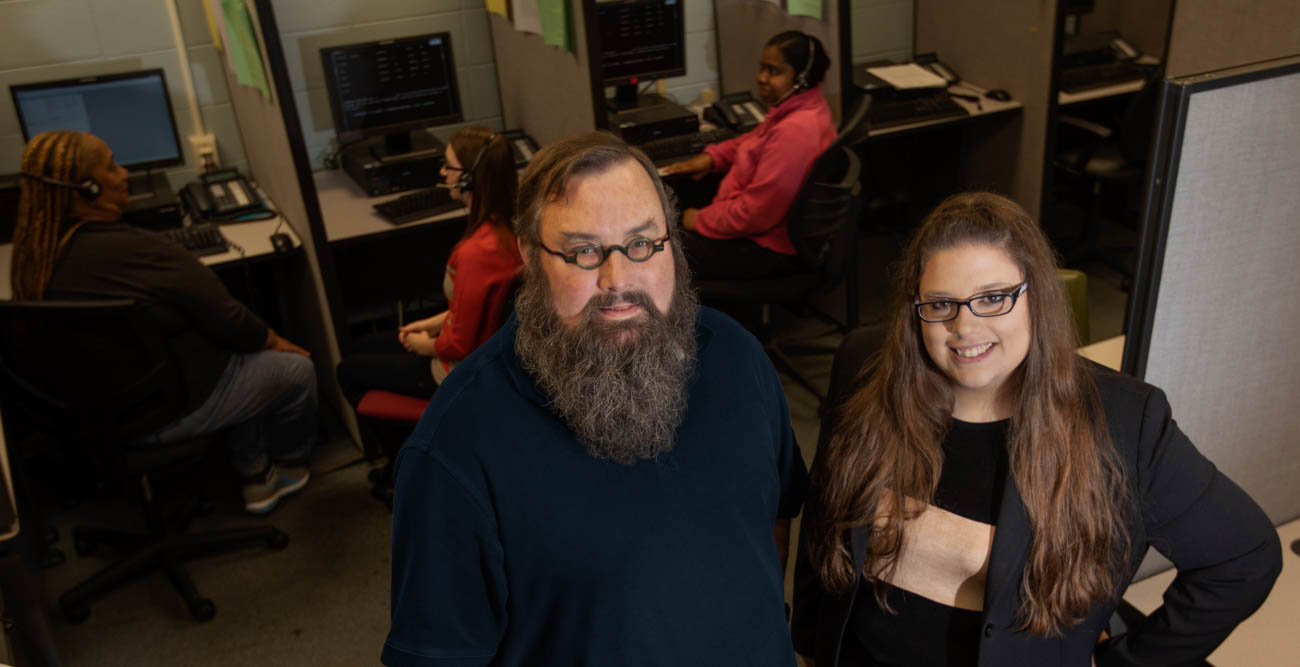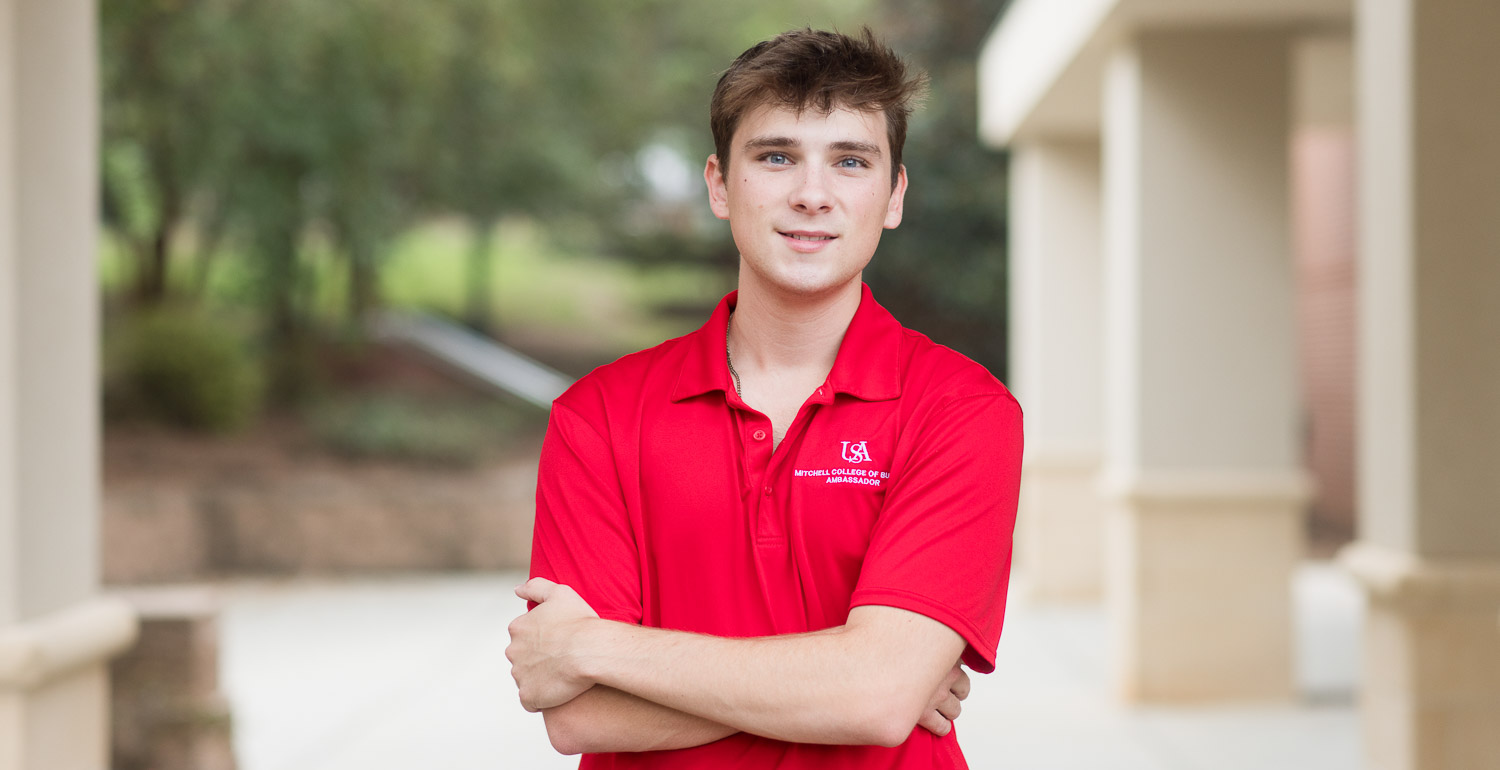Survey Says! USA Polling Group
Posted on January 25, 2019

When the USA Health system needed a full-service research partner for a large, federally mandated report, it found what it needed right at home: the University of South Alabama Polling Group.
USA Polling, part of the political science and criminal justice department, operates an interviewing lab in the Humanities Building. Its low profile belies the extent and intricacy of its work, not only for USA but also for outside clients. USA Polling conducts surveys about everything from health care and public policy to schoolchildren’s summer vacations.
The work is technical and tricky. “You can’t just say, 'Well, I’m going to ask these questions and then just say this many people said yes; this many people said no,'” said Dr. Jaclyn Bunch, associate director of USA Polling. “Surveying is way more complicated.”
Denise Anderson, care management director for USA Health, is working with USA Polling on the health system’s 2018-2019 Community Health Needs Assessment, or CHNA. “They went over and above anything I would have expected,” she said.
By federal law, tax-exempt hospitals must complete a CHNA (pronounced “China” in health-care circles) every three years and make the results public. It’s an enormous, complex undertaking.
“The thing that was so impressive about the USA Polling Group,” Anderson said, “is that they spent the time to talk to me as the client to see what my vision was, what my expectations were and how I thought we could make all of it come to fruition. And then they built on that.”
“They spent the time to talk to me as the client to see what my vision was, what my expectations were and how I thought we could make all of it come to fruition.”
She said that when USA Polling did the previous CHNA in 2015-2016, Director Dr. Thomas Shaw researched the federal CHNA regulations on his own before meeting with her. Then, Anderson said, “Not only did they do the polling, but they also did the analysis of the relevant comparison data, worked with our network that we have at USA about what we were currently doing to help better our scores and enhance the community scores, and put together the whole package.”
For each CHNA, USA Polling surveys hospital and clinic managers, health department administrators, nonprofit organization executives and others who supply or oversee health care. It also asks the recipients of health care — randomly selected Mobile County residents — about their health needs.
Then Bunch digs out data compiled by the Census Bureau and other public and private sources. She compares Mobile County to Alabama and to the nation in such categories as infant mortality, accidental deaths and specific diseases like diabetes.
In an example of cooperation among competitors, USA Health partnered on the project with two other local hospitals. It made financial sense, Shaw said. “Rather than each group having to do their own independent data collection and writing their own reports,” he said, “if all three groups worked together, it would provide a cost saving to each group individually for us to do one-time data collection.”
USA created the polling group in 1992 to conduct weekly public opinion polls for Mobile's Press-Register newspaper. The group’s mission and methods have evolved considerably since then. “USA Polling Group, even though it has ‘polling’ in the title, is more of a survey research organization than just strictly polling,” Shaw said.
Surveying is a challenging blend of art and science. The structure of the questions (true-false? multiple choice?) can bias responses. So can their wording and even their sequencing. The rise of cell phones has made it harder to reach a representative sample of the survey population. The answers need to be weighted to reflect the sample. If most respondents are women, for example, then the surveyors will give extra weight to men’s answers.
Most people probably associate polling with politics. “We typically do not work for political candidates,” Shaw said, “because as a university we want to maintain a third-party stance toward individual candidates and don’t want to look like we’re working for a particular candidate or a particular party.”
Back in 2013, USA Polling did partner with Lagniappe, Mobile’s independent weekly newspaper, during the first mayoral race between then-Mayor Sam Jones and challenger Sandy Stimpson. Two weeks before the vote, “we had the election at 47 percent each with 6 percent undecided,” Shaw said. “If we had called the election then, we would have allocated all 6 percent to Stimpson,” on the theory that voters who still hadn’t made up their minds at that late date harbored some dissatisfaction with the incumbent.
So USA Polling would have predicted a 53-47 percent victory by Stimpson. He ended up winning by 53.5 percent to 46.2 percent.
USA Health has used the polling group for marketing surveys as well as for CHNAs. Other projects often arise within the USA family. “Professors might get a grant, and part of that grant might require that they need to do some data collection,” Shaw said.
Nonprofit organizations outside the University are frequent customers. “We’ve done work for the local drug education council,” Shaw said. “We’ve done work for the Alabama campaign to prevent teen pregnancy, looking at sex education in Alabama. We’ve done work with the Public Affairs Research Council of Alabama looking at political priorities in the state of Alabama. We just finished doing a survey of Alabamians throughout the state looking at their attitudes and perspectives about the length of summer break for public schoolchildren.”
Sometimes, USA Polling even works with individuals. “We had a gentleman contact us a couple months ago,” Shaw said. “He’s interested in people’s perceptions of the quality of Mobile Bay water. We gave him a cost proposal, and he’s working on trying to raise money.”
USA Polling operates at cost, charging only to cover its expenses. “Survey research is expensive,” Shaw said. “But if you compare us to a for-profit center, we’re actually rather inexpensive.”
The group primarily conducts surveys over the phone or internet. Changing times and changing technology have forced changes in survey methods. Shaw, an associate professor of political science at South, got his doctorate in 1998. He said he tells his disbelieving students, “When I was young, when the phone rang, everybody wanted to know who it was. Everybody wanted to answer it. Nowadays, if the phone rings in a house, everybody’s like, ‘I’m not touching it.’”
The polling group avoids the common survey practice of autodialing — having a machine continually dial numbers, switching the call to a live interviewer when someone picks up. It’s efficient, but if all interviewers are tied up when the call is answered, an annoying silence greets the respondent’s “hello.”
Instead, USA Polling’s interviewers do all the dialing and respond immediately when someone answers. USA Polling buys lists of numbers from a vendor. “For a given project,” Shaw said, “I might order 5,000 numbers. I’ll get 2,500 landlines, and I’ll get 2,500 cell numbers.”
The landline numbers are random digit dialed, meaning that the first eight digits are from working numbers and the last two digits are randomly generated. That lets surveyors reach a representative sample, including unlisted and do-not-call numbers. (Survey researchers are exempt from the do-not-call law, but if a caller says, “Put me on your do-not-call list,” USA Polling honors that request.)
The cell numbers, in contrast, are full numbers, randomly selected from the area being surveyed.
USA Polling hires student interviewers, supplemented by temporary workers provided through an employment agency. Graduate students work as supervisors. “It’s a really great learning experience for them,” Shaw said.
Mistrust of polls is common, and sometimes justified, Shaw and Bunch said. Internet services such as SurveyMonkey allow almost anyone to conduct a poll. Usually, such surveys are so poorly designed that their results are worthless.
“It’s hard to communicate the importance of random sampling and the importance of question wording,” Bunch said. “You can’t just have one option that says I favor this and then seven options that explain why you don’t favor it.”
That kind of polling produces ridiculously unreliable results. Yet corporations, and voters, sometimes base crucial decisions on such data.
“A huge component of our job is the need to educate people about what these results mean, how we can understand them and what we can and cannot interpret from them,” Bunch said. “That’s why it’s a good fit that the polling center’s in an academic institution, because these things should be treated in an academic manner.”
The USA Polling Group can be contacted through its director, Dr. Thomas Shaw, at 251-414-8025 or tshaw@southalabama.edu.
Five Polling Challenges (Aside From Disappearing Landlines)
- People screen calls or hang up at the first sign of a sales pitch. “The fact that we’re associated with the University helps a great deal,” said Bunch. “You’re able to start by saying, ‘I’m calling from the University.’”
- Media outlets and the public want definitive predictions, which polls don’t provide. “We deal in probability,” Bunch said. “We don’t deal in certainty.”
- People misunderstand or ignore the margin of error. If a political poll with a 3 percent margin of sampling error shows a candidate ahead by five points, that candidate may actually lead by 11 points. That's because one candidate's numbers could skew three points higher, while the second's could lag by three points (5+3+3=11). Conversely, the candidate ahead by five points may actually be behind by one point (5-3-3=-1).
- Wording of questions matters. “There are all these response effects that we need to be aware of, right down to what words you use and in what order do you put a question,” said Bunch. “Should this be a free-response question? Should this be multiple choice?”
- Attention spans have diminished. “They used to have really long surveys 30 and 40 years ago,” Bunch said. Today, USA Polling shoots for a maximum of 25 questions, taking no more than 10 minutes. “If you want a good response rate, you have to pay attention to the average attention span.”



